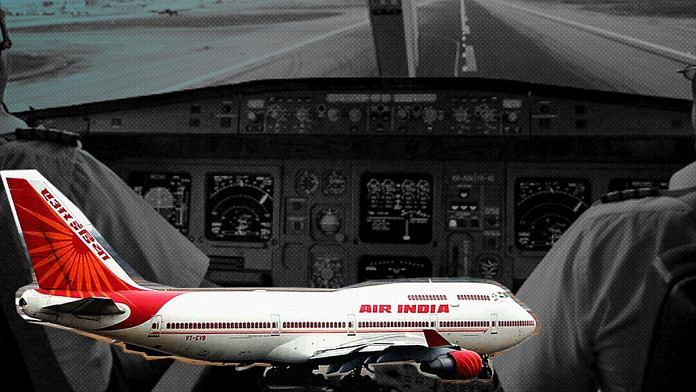An airhostess with Air India fell off the craft that was getting ready for departure Monday at the Chhatrapati Shivaji International Airport in Mumbai. The incident comes close on the heels of an Air India Express flight hitting a wall right before take-off last week.
ThePrint asks: Air India staff falls off plane: Is a flight mishap waiting to happen or fear exaggerated?
These incidents must be reported, but not hyped unnecessarily
 Mark Martin
Mark Martin
Aviation expert and CEO, Martin Consutling
This incident isn’t even close to being a ‘disaster’ as it is being made out to be by the media. The flight attendant fell off the plane purely out of her own stupidity/negligence. A safety tape is to be applied on the door and it wasn’t. The crew are trained to follow certain steps before take off, something that wasn’t adhered to. A few days ago, there were reports of a flight ramming a wall. The reason behind it was technical in nature. The rotation was delayed because of a wrong speed and wrong flap calculation. As a result, the wheel hit the perimeter fence. Luckily, it managed to escape grave damage.
None of this means that the aviation industry is about to collapse. As long as there is a need for affordable and convenient travel, people will inevitably choose air travel. This is the basic tenet that will continue to drive the aviation industry. It is true that these incidents are worrisome and demand our attention. Safety is an important concern in any and every industry. The oil and natural gas industry experiences two deaths per month, on an average. No one questions the ONGC. This is because people have a false impression of the aviation sector as one that’s for the rich and the famous. On the contrary, flights promise an affordable and efficient means of travel. Of course these incidents are worth being reported, but not worth being hyped unnecessarily.
Air India follows all flight safety regulations to the T
 Praveen Bhatnagar
Praveen Bhatnagar
Spokesperson, Air India
The incident in question doesn’t tell us anything about Air India or the aviation industry per se. We don’t know yet what was the exact reason behind the flight attendant’s fall. We will wait for her to recover and then investigate. However, one can safely assume she lost her balance and fell. Now, this isn’t something unique to aviation – people are likely to lose balance and injure themselves anywhere. This isn’t a safety mishap as it is being made out to be. I can tell you that Air India happens to be an extremely safe airline. We follow all flight safety regulations to the T.
There is no reason to either worry, or unnecessarily create a scare among others. The technical requirements are always met before and during every flight. It’s not as if this was the first time the flight attendant was closing the door of the airplane. She has probably done so innumerable times in her career.
People make mistakes. For instance, while walking on roads, we may find construction work happening at some corner and despite all the disclaimers, we hear about people injuring themselves. So, instead of hyping up this one event, we need to let it pass and focus on all the good work aviation sector does on a daily basis.
Also read: Maharashtra to draft its own civil aviation policy to boost regional connectivity
Pilots & flight crew under lot of pressure due to increased demand
 Karma Paljor
Karma Paljor
Editor-in-Chief, EastMojo
In aviation, no incident or accident can be taken lightly. In an aircraft, a tiny malfunction can lead to a bigger problem and ultimately a catastrophe. One can argue that these incidents are one-off. But, it is difficult to overlook the larger worry around aviation operations in India.
Last year, India ranked below Myanmar, Bangladesh, Maldives, Pakistan, Sri Lanka, Nepal and even North Korea in a safety audit conducted by International Civil Aviation Organisation (ICAO). This is certainly not good for a sector that prides itself for being the fastest growing in the country.
Airline insiders routinely warn against the speed at which the companies are functioning. A safety officer in a top low-cost airline told me that safety is being compromised to meet schedules. On one flight, a passenger found a cell phone left behind – normal if you were in a bus, but not in an aircraft where checks are stringent before every flight and nothing is left to chance. This could easily have been a weapon or a bomb.
Pilots and flight crew are under a lot of pressure due to the increased demand, especially in the domestic sector. To have an airline like Jet under financial stress has only added to the woes. Now, we have stressed unpaid pilots and crew manning flights.
Our air traffic controllers are not licensed but follow a rating system. They are evaluated by their employer, the Airports Authority of India, but should ideally be evaluated by an independent body. This is one of the reasons for our low rating by the ICAO.
A lot of things have to go right for a plane to fly safely
 Harshvardhan
Harshvardhan
Aviation expert and chairman, Star Air Consulting
Daily flights in India carry approximately 12 million passengers and have nearly 5 million people working on the tarmac. To suggest that such a vast set-up will not witness any accidents is unfair. Ultimately, it boils down to a combination of two things – individual safety measures and the environment of safety nurtured by the organisation. As far as this incident is concerned, it isn’t a ‘disaster’. Crew members working in a flight may end up having pangs of anxiety and err. This was an isolated accident and should be viewed as such.
However, the plane ramming a wall last week was definitely a huge disaster. It was an error in the aircraft and only the skill of the pilot salvaged the situation. Another recent incident which comes to mind is the one involving a Jet Airways flight wherein the cabin pressure dropped.
That was a grave error on the pilots’ end. All these incidents tell us that a lot of things have to go right for a plane to fly safely. The uncertainty of the machine, combined with natural elements such as the air pressure, plays as important a role as the crew working on the flight. One can never be 100 per cent safe, and it is always an ongoing process.
We must also remember that the percentage of accidents have gone down considerably, even if the number of accidents may have increased purely because the total number of flights has increased.
Air India is one of the safest airlines in the country. In fact, it is the only airline that has a high expenditure on safety. All private airlines put together may not be spending so much on safety.
By Fatima Khan, journalist at ThePrint. You can follow her on twitter @khanthefatima.



